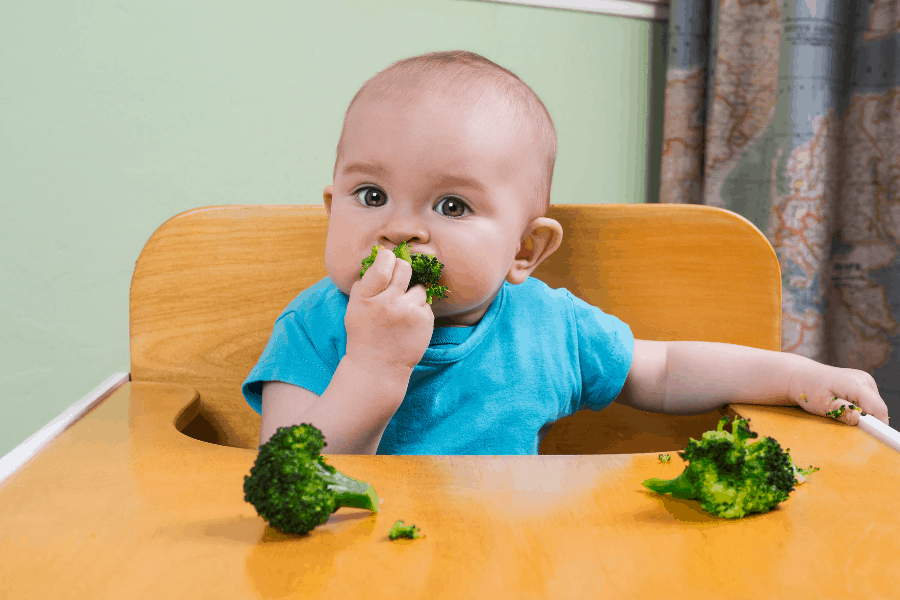This post may contain affiliate links which means I may receive a commission from purchases made through links. I will only recommend products I have personally used. Thanks.
Can you identify signs a baby is constipated? Constipation in babies less than one year of age is prevalent. It is equally common for babies to go for quite a long time between bowel movements. Similarly, a baby can go for days or significantly over seven days without having any bowel movements.
Although, a baby may, in some cases, be constipated and need a little assistance. It is also possible that constipation is not an issue of concern; instead, your baby may need time to establish their timetable for having a regular bowel movement.
As a mother of 4 children, I can tell you that most babies will experience constipation at some time in their childhood. Others may have unpredictable bowel habits until they can adapt to their unique bowel pattern. In this article, I will outline some of the main symptoms of constipation in babies and effective remedies to help you relieve your baby’s symptoms.
It’s easy for parents to misunderstand constipation and its impacts on a baby. This is likely to be because babies can’t tell you whether they’re having issues with pooping or not. A couple of fundamental facts about your child’s diet can help you keep things in context. For example, a baby who is exclusively breastfed may not poop regularly. The reason for this is relatively straightforward. Since breast milk is so nutritious, at times, a child’s body assimilates practically every last bit of it, leaving little to travel through the stomach. In this instance, your baby may poop just a single time in a long while. In this scenario, your breastfed baby who decides to open their bowel once a week is unlikely to be constipated. Whereas, if the same baby were to be formula fed and does not open their bowel in a week, constipation may be the culprit.
As a parent myself, I recall many times that it was not apparent that constipation was the reason for my child’s difficulties with pooping. In time, you would learn more and should be able to join the dots and offer the right solution for your baby.
To help you with the process, I have listed some of the common signs and symptoms that should help you decide whether your baby is constipated.
Signs a Baby is Constipated
A clear indication of constipation in newborn and older babies is the absence of stool. Another sign of constipation in babies is infrequent or irregular pooping. Bowel movements can vary depending on age and how much food your baby consumes in terms of solids. This variability makes it slightly tricky to understand when your baby is constipated. To establish when constipation is an issue, you need to know what to expect in regular bowel movements in children. Research indicates that up to four poops a day can be expected in babies. Generally, up to 3 bowel movements each day is typical. In later stages, these may reduce to 1 poop every day.
Children who go over five days without passing stool might be constipated. An abrupt change in bowel patterns may likewise indicate that your baby is constipated, mainly if they have established regular bowel habits and are known to pass stool every day and, out of nowhere, go a few days without doing so. Other signs of constipation in babies include;
1. Hard stools
It’s not uncommon for babies to pass stool inconsistently or even strain a piece during bowel movements. Regardless, your baby’s poop ought to be soft and easily discharged. Grainy or dingy surfaces are expected. If stool turns out to be hard or looks like pellets, constipation might be the cause.
2. Excessive straining
Some stress is not out of the ordinary during bowel movements, particularly among babies. Feeble stomach muscles can make it hard for them to pass stool, therefore cause them to strain. Constipated babies, however, take this to a higher level by curving their backs or sobbing for a long period. If you find your baby is uncomfortable or tearful during bowel movements, this might indicate that they are constipated.
3. Blood stools
Under normal circumstances, a baby’s stool should not have blood. However, blood might show up when babies strain unreasonably to poop or experience a little crevice while passing pellet-like stools. Therefore, it is common for babies with constipation to strain while pooping. This can cause blood-streaked stools as the hardened poop may result in tiny tears in the anus. Doctors and experts call this an anal gap.
4. Black Stools
Numerous tones are normal for infant and newborn stools, including yellow, brown, and surprisingly dim shades of green just after birth. By the time your baby gets to about half a month in age, their stool should not be dim in color. Dark poop, specifically, demonstrates that something isn’t right. While blood might appear in a child’s stool from straining during constipation. It could also indicate an infection, which should be referred to a pediatrician without delay. It is also worth noting that traces of blood are at times ingested during breastfeeding if your nipples are broken. This may show up as dark spots or dull red in your baby’s poop.
5. Belly Pain and Bloating
Belly pain and bloating can be another sign your baby is constipated. Constipated babies may regularly have colic torments (cadenced fits of agony in the mid-region of their belly). When constipated and bloated, your baby may not have any desire to eat and may even regurgitate a bit.
6. Clenching buttocks
A baby with constipation may have fewer or infrequent bowel movements than a baby without constipation. Constipation can cause a baby to retain stool by securing their posterior. Some babies with constipation develop surprising habits when they want to open their bowel. Babies may curve their backs, fix their bottom, and cry. Older kids may shake to and fro while solidifying their bottom and legs, curl their backs, fold their legs, remain on tiptoes, and wriggle or squirm, or they may crouch or get into other strange positions. Babies clenching their buttocks might be another sign of constipation.
7. Hard belly
A hard belly could be a sign of constipation. This is often linked to the build-up of poop and gas. Reasons for constipation in babies include bottle-feeding as opposed to breastfeeding. The introduction of new food can lead to constipation in older babies. Likewise, if your baby passes firm or pebbly stools and cries or strains during bowel movements, they may be constipated.
Effective Home Remedies
The good news is that there are steps you can take to relieve your baby’s symptoms, and, in most cases, you should be able to eliminate constipation. Having explored the telltale signs a baby is constipated, here are some of the home remedies and dietary changes discussed below can help your baby or toddler by relieving their constipation symptoms and enable them to regain a regular bowel habit.
1. Massage
Belly massage is an excellent method of improving your baby’s bowel habits. It is suggested that you utilize delicate hand movements in a clockwise direction to encourage the guts to move to the rectal area. You may also utilize any baby oil for massaging. There are a few different ways to massage a child’s stomach to soothe obstruction caused by constipation. These include:
- Utilizing the fingertip to make round movements on the stomach in a clockwise direction.
- Strolling the fingers around the belly button in a clockwise direction.
- Holding the child’s knees and feet together and tenderly pushing the feet toward the stomach.
- Stroking from the rib confine down past the belly button with the edge of a finger.
2. Fruit juices
A modest quantity of pure apple juice can help your baby by softening their stool. Once your baby gets to at least 2–4 months of age, they can have a small quantity of organic juice, for example, 100% prune or squeezed apple. This juice may help treat constipation.
Specialists may suggest beginning with around 2–4 ounces of natural organic juice. Just like grown-ups, inadequate intake of fiber may cause constipation in babies as well. Therefore, the presence of gelatin, a water-dissolvable fiber in apples, helps treat constipation. You may also juice an apple together with its skin and give it to your baby daily to relieve their constipation.
Similarly, Prune juice is very effective in combating constipation in both adults and babies. Prunes are standard intestinal medicines, and prune juice does something unique in breaking down built-up stools in babies. When giving your baby prune juice, be patient as it might take up to four to five hours before the effect can be seen.
However, I would suggest that you do not give natural juice or any home remedies to your baby without consulting their pediatrician. If you have identified signs a baby is constipated, I would encourage you to discuss your concerns with a pediatrician in the first instance before considering any home remedies.
3. Changes in diet
Specific dietary changes may help relieve constipation in babies. However, these will depend upon your baby’s age and nutritional requirements. For instance, while breastfeeding your baby, you could consider avoiding specific food sources, like dairy. It might take some experimentation to distinguish an effective dietary change, and it is also likely that adjustments to your diet may have no impact on your baby’s constipation. For babies on solids, you may wish to introduce a variety of recipes. Introducing a variety of vegetables and fruits is known to help with bowel movements and relieve constipation.
Great food choices for children with constipation include:
- Apples
- Broccoli
- Entire grains, for example, cereal or wholemeal bread or pasta
- Peaches
- Pears
- Plums
4. Exercise
Moving your baby’s legs can be an effective means of easing constipation. Like the benefits that exercise offers to adults, babies equally benefit from a range of motion, particularly when constipated.

However, as babies cannot initiate a range of movements on their own yet, you may need to help them exercise to ease constipation. To do this, you can tenderly move your baby’s legs while lying on their backs to emulate the movement of riding a bike. Doing this may help the insides work and relieve constipation. If your child is at a crawling stage, you may encourage them to move around in the house. However, if they are younger, you may assist them by moving their legs in forward-reverse movement, round movement, or siphoning movement. This can offer an efficient baby constipation remedy if done correctly.
5. A Warm Bath
Giving your baby a steaming bath can help them to relax. This can also ease the uneasiness linked with constipation. A warm water bath is an optimal method to alleviate and loosen up strained muscles. Fill your child’s bath with warm water and put a couple of tablespoons of baking soda in it. This will assist the rectal muscles by enabling it to open up and encourage easy bowel movements.
6. Fluids and Hydration
Young babies don’t ordinarily require supplemental fluids as they get most of their hydration from breast milk or formula milk. Nonetheless, babies who are constipated may benefit from additional fluid intake. Pediatricians sometimes suggest adding a small quantity of water or, every so often, organic juice to the baby’s diet when they are more than 2–4 months old and are constipated. Constipation may happen if your baby is not getting enough fluids through their diet. Therefore, if your baby is more than half a year old, it is recommended that you offer sufficient fluids through their diet. Soups, fruit juices, milk, and water are a few alternatives to increase your baby’s fluid intake. Adequate measures of fluids in your baby’s body may help improve their bowel movements.
7. Coconut Oil
Once a parent identifies signs a baby is constipated, the next question is; “How can I relieve my baby’s constipation fast?” Natural coconut oil can be effective in helping your baby to open their bowel, especially if they are experiencing difficulties in passing stool. You may add a few milliliters of coconut oil to your baby’s food if your baby is over six months old. However, if your baby is under half a year old, you may wish to apply coconut oil around their anus to facilitate easy discharge of stools.
To sum up, constipation in babies is common. Some of the obvious signs a baby is constipated are; not opening their bowels for days, passing hard pellet stools, bloating, stomach pain, blood-stained stool, clenching their bottom, or appearing uncomfortable pooping. Please be assured that although constipation can be serious and, in some cases, life-threatening, there are several easy steps you can take now to improve your baby’s symptoms and encourage them to develop a regular bowel habit. Some effective remedies for you to consider are; massage, giving your baby organic fruit juice, increasing their fluid and fiber intake, exercising, applying coconut oil, and giving them a warm bath.
I hope you find the above a helpful resource in dealing with baby constipation. As always, if there are any remedies or methods you have tried and found to be effective in dealing with baby constipation, please share them with us. We are always delighted to hear of your experiences, as these may help other parents struggling with constipation.
Written and clinically reviewed by Christine Dickson (Registered Nurse)
Other related post you may like;
7 SAFE BABY COLD HOME REMEDIES TO RELIEVE YOUR BABY’S COLD SYMPTOMS
9 EASY STEPS TO HELP YOUR BABY SLEEP THROUGH THE NIGHT
10 STEPS TO SUCCESSFULLY WEANING YOUR BABY
Related Posts
- When do Babies Start Cooing and Smiling ? 7 Essential Tips to Improve your Baby's Communication
When do babies start cooing and smiling? Of course, every parent wants their baby to…
- 7 Simple and Effective Steps You Can Take Now if Your Baby is Not Eating
It’s undoubtedly a worrying time if your baby is not eating. You’re likely to be…
- 10 Steps to successfully weaning your baby
Being a parent, you will surely agree that we are in a never-ending learning process.…







